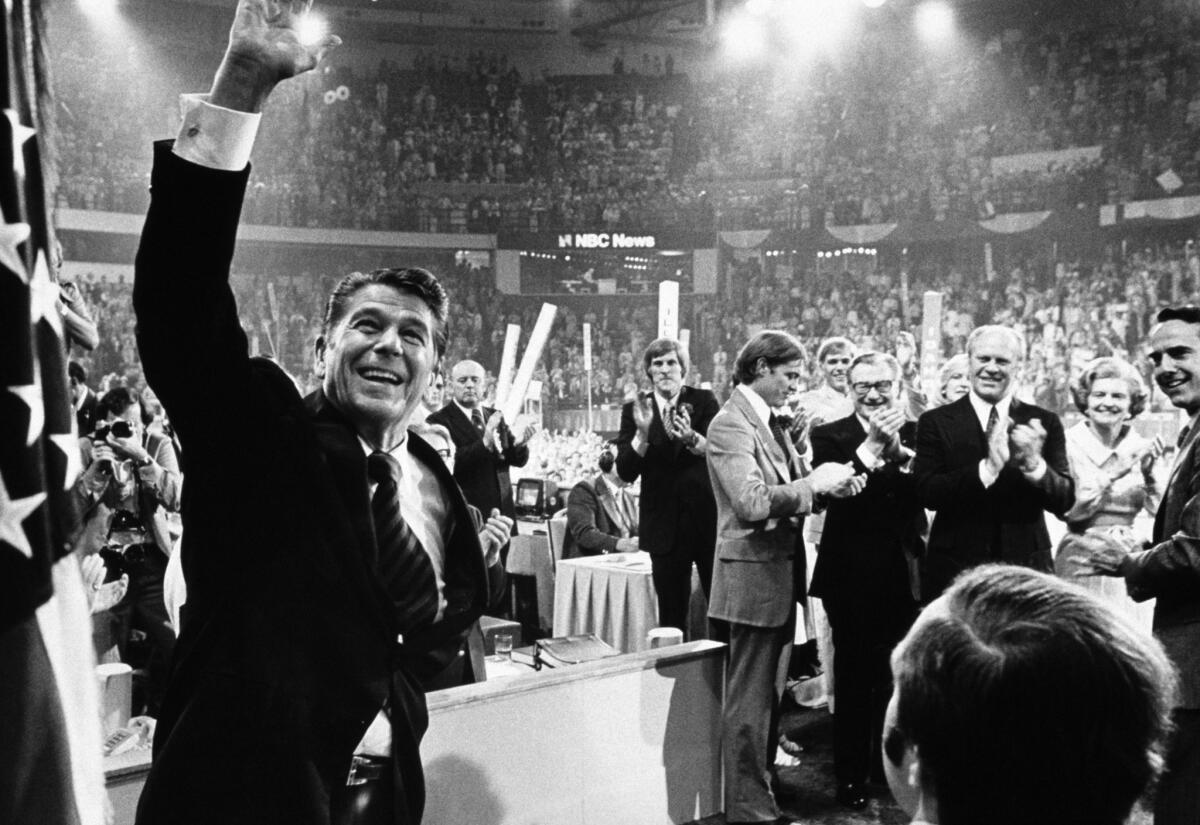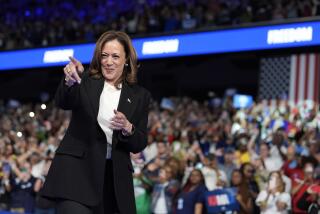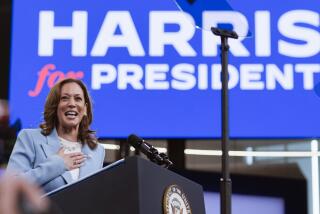Opinion: The presidential nomination process leaves many of us on the outside

The last time the Republicans didn’t have a clear nominee by the start of the national convention was in 1976, though Gerald Ford, right, managed to win over Ronald Reagan on the first ballot anyway.
With the Iowa caucuses on tap for a week from Monday, fast-forward ahead to October, when we’ll be in the home stretch of this seemingly eternal presidential race. So who will our voting options be then? Donald Trump versus Hillary Clinton? Ted Cruz versus Bernie Sanders? Marco Rubio versus Martin O’Malley?
We should know the answer come July, when both major parties hold their national nominating conventions, which for the Democrats will likely be a coronation. But the Republicans, deeply divided over their roster of contenders, could very well find themselves slogging through an old-fashioned brokered convention if no candidate captures enough primary and caucus delegates to win the nomination outright.
That’s all fun stuff for political junkies. But the process also evidences one of the grave weaknesses in our political system: how few people actually are involved in selecting the candidates the rest of the country has to live with, a function of political party rules, state laws and a disaffected electorate.
Join the conversation on Facebook >>
As an eternal outsider, I’ve long thought our system of selecting presidential candidates is for the birds. It’s dominated by the two major parties, but they together represent only 56% of American voters (nearly all of the rest of us don’t register with or consider ourselves part of any party). So the two entities that oversee the processes for selecting the two main candidates for the presidency each do so by drawing from a pool of roughly a quarter of all eligible voters.
To be sure, caucuses and primaries in some states allow unaffiliated voters to join the party for a day or two to cast a vote in the nominating contest, but relatively few independents do that (we’re unaffiliated for a reason). Here in California, you generally have to be a party member to vote in the presidential primary (state elections are different), though the primaries tend to be held so late in the process that the race is over by the time our polls open.
That, of course, could well be different for California Republicans this time around. Under national party rules, states holding early caucuses must award convention delegates proportionate to the primary or caucus results. California, though, will award the vast majority of its delegates under a winner-take-all system in each of the state’s 53 congressional districts. So if there is no clear nominee by June 7, the fight here will matter.
This isn’t to suggest the Democratic nomination fight is already over, but it probably will be by California primary day. With only two candidates – Clinton and Sanders – gaining any traction, one of them will likely have the nomination locked up much earlier than the Republicans.
So about those primary elections. In 2008, the last significant contest for an open presidency, the nationwide primary turnout reached 30.3% of eligible voters, just a few ticks under the record 30.9% turnout in 1972, propelled then by Democrats hoping to oust Richard Nixon. George McGovern won the nomination and, well, in the end Nixon easily kept his job (despite skullduggery that eventually led to his resignation).
So even in the most competitive nomination fights, fewer than one in three eligible voters decide who the major presidential candidates will be, and those voters are overwhelmingly members of the Democratic and Republican parties – a slice of a slice of the electorate.
No wonder so many people find so few reasons to get fired up about presidential candidates come election day.
Follow Scott Martelle on Twitter @smartelle.
MORE FROM OPINION
Yes, millennials, Hillary Clinton is a feminist
We can’t afford to expand social security – and we don’t need to
Bernie Sanders and Americans’ misconceptions on socialism
More to Read
A cure for the common opinion
Get thought-provoking perspectives with our weekly newsletter.
You may occasionally receive promotional content from the Los Angeles Times.











